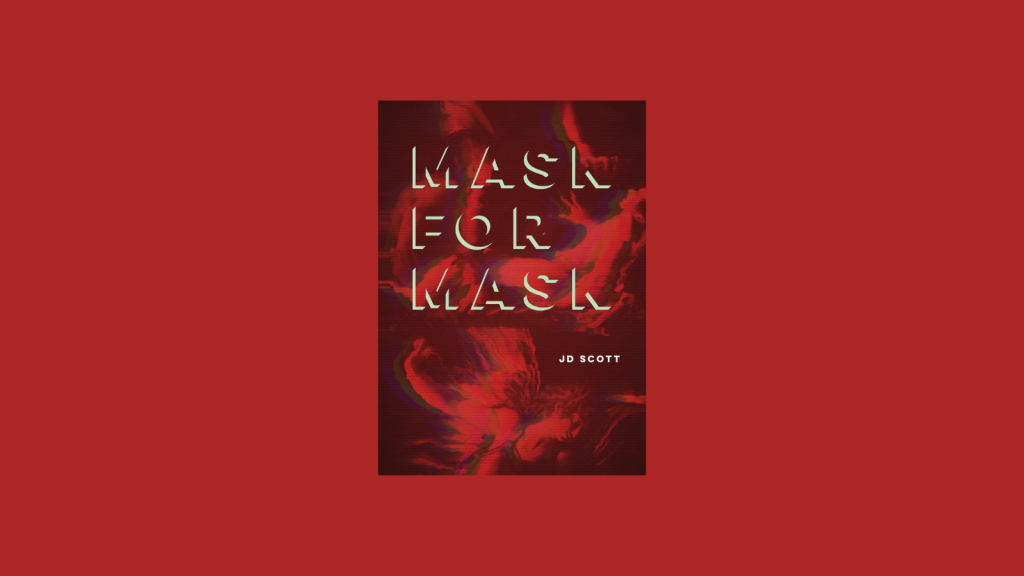With élan in various guises, JD Scott’s debut full-length poetry collection Mask for Mask sizzles, sparkles, and smokes from poem to poem. Of course, given the recent atmosphere, a title with “mask” in it immediately connotes the pandemic and how we are all literally wearing masks. This physical donning of the accessory has become a new reality, but, of course, dissimulation is old as humankind—and Scott is not so literal. It’s also fascinating reading this collection during a pandemic because Mask for Mask focuses so much on small spaces packed with bodies, bodies touching, or bodies compelled to practice kissing or embracing the self. Whether inside a gym or Korean sauna, the bedroom, or a gas-guzzling Escalade, people—and moments—are pressed together with urgency and fear, desire and repulsion. Every attempt to link selfhood to a more significant historical myth begins to crumble, and that is ideal, or it is time to “grow[…] into a new shape,” as Scott writes in the final poem, “Headtrip.”
As intimated, Scott’s poetry goes far deeper than the current moment. There’s something iridescent about this collection that offers layer upon layer, concealment upon concealment, shields, and protections that need penetrating to let in the true divinity (beckoned or not). The narrative voice often and thoroughly feels like the nagging, discrediting “bad angel” that disallows someone from seeing and experiencing truth as it should be shared. In a current landscape of “deep fakes” and “false narratives,” the overall, timeless theme of dissemblance is not lost on readers. What Scott does is continue to complicate it, harnessing “cytoplasm” and “car crash”; Lilith and Zeus; Eden and Escalade. In every corner and time, we find mystique and bottled lightning cracking the glass.
With two “mask” references in the title, moreover, we are reminded of the two masks of drama, tragedy and comedy, sadness and joy: we wear each at any particular time and are sometimes forced to wear both, becoming ourselves a portmanteau of “tragicomedy.” The intricacies are deeper, larger, and more complicated when addressing queer experience and the journey towards finding space in which to exist—safely—as self. JD Scott’s work is a portmanteau in its way, a yoking of an ancient art form with today’s modern communication methods, not to mention a more nuanced look at ineffable, unhooked identity.
Scott is an inventive, experimental writer who pens in many genres. They take an imaginative leap with Mask for Mask, using emoticons and netspeak, symbols, and elusive and allusive references. We swim, in Mask for Mask, through a sticky glut of ideas that, ironically, leaves much unsaid, the spaces and gaps in often dense lines and stanzas indicating a breaking—from reality, from consciousness, from communication—that is always resurrected later with a fresh idea hitched to the previous one. We are gladly pulled along through this underbelly of some alternative universe where the body always feels like a betrayal, where materialism feels like a betrayal, where living itself feels like the greatest betrayal of all. And, yet, and again, that longing to connect with people, even casually, throbs beneath the surface.
To remove the masks can be a risk: “I’m collapsing beneath myth and metaphor,” the narrator admits in “Judgment (XX),” adding they are “a boy who believes in the classification / of all things and keeps the inverted / card of Judgment on his nightstand.” Relinquishing masks invites chaos and vulnerability. And, yet, Scott’s speaker does not seek grace: “Grace is overrated,” they write in “Cathedral.” They continue:
I don’t want sanctification that’s a long word and I don’t want it. I desire a higher life. Not the highest life[.]
The goal of finding something better, even if not best, feels modest, familiar—doable. And, yet, why the difficulty struggling to survive the car crash of life? We all want to know.
What captures attention and surprises most is a recurring pattern of cleanliness and ablutions. Scott often writes of this desire to cleanse, whether in the shower of “Equinox” or in “Garçon” when the eponymous figure has a “khaki rag,” wiping “circles” that seem to go nowhere and with “concentrated sanitizers” within reach. The referenced jjimjjimbangs elsewhere connote purification. But the “purest heart,” as mentioned in “Edenic,” is often surrounded by tainting forces: nightclub toilets and defecation, among others. Scott’s poems are all a kind of wiping down, wiping away—of cleansing. But they are sometimes also a dirty rag that, in wiping clear one spot, reveals or makes another. Circularly, then, cleanliness leads to contamination and entrapping feelings, in line with the darker mood permeating many of these poems.
Accordingly, in “King of Swords, Reversed,” we find that the same “soap and water” that can be cleansing can also be a killer. “Plenty of people have been injured/in bathrooms, with all that soap and water. / These rooms are statistically dangerous,” Scott writes. It is quite true that the same thing that saves you can destroy, the same thing that professes to purify you, can just make you dead, wiping you out of existence and impossible to exist. In Mask for Mask, there’s a fear of filth (stigma) but also the embracing of it (self-acceptance).
Furthermore, there’s a sort of chanting of what the body can do, and in these sacred moments, we find the sacrilegious coexisting. So comes the title into play once more, the “mask” of one thing sometimes replacing the “mask” of the other—or being worn one atop the other. There’s also a clever play on “masc for masc,” calling into question gender identity and how people aim to label what they think they see—all the time, perhaps, only seeing the masked variation of the individual projecting invariable guises, numerous selves, and always trying to contain these multitudes. Maybe Scott’s is a particular kind of passing poetry—“masc” for “mask.” A mask for the masculine that is code for “identity” in general. Do two masks cancel each other out? Or are they layered, like nesting dolls, taking us further from selfhood? It’s a wrestling (also suggested by the cover art) with the inner demons of questions, but, as Tennessee Williams famously and rightly declared, “if I got rid of my demons, I’d lose my angels.” In Scott’s version, the narrator admits to being
wary of a reality that cannot be punished
as in “D Student.” And in “Cathedrals,” the author writes, “My one // desire is to be disobedient and ruin every-/thing with my cold, degrading hands.” Thus, the inner turmoil central to Scott’s collection positions creation and destruction, connection, and repulsion as necessary forces in human experience that draw an individual closer to self-knowledge without minimizing any aspect, good or ill, of living.
As I finished Mask for Mask and then reread a few poems and passages that stuck with me, I thought a lot about expulsion—from the Garden of Eden, a history of LBGTQ+ marginalization in society, the leaking of blood and fluids, the rejection of circumstances and false-narratives. “This one’s for me,” Scott writes in this poetry collection’s dedication. They are absolutely right: ten years’ worth of work (as Scott mentions) has gone into Mask for Mask and the expelling of inner anxieties, observations about which they can’t break free, and dangerously destructive beliefs that need airing very much populate the pages. If Mask for Mask is an exorcism of sorts, that is unsurprising. A letting and letting go. Blood is often mentioned, too—as if the quickening impulses under the surface of skin and muscle are the guiding force of identity and the signs of life spilled or the violence done to others or the self. Blood is complicated as much as identity is and, thus, it—like masks—becomes a useful connective thread, a conceit of, in this collection, queer existence.
The poems often move in unexpected ways, like fishes of thought floating and drifting through the pages. And there’s playfulness and tension. Some poems read almost like computer code, and some poems look like lists on the page, and it is tempting to read them vertically as well as horizontally. Still more, some poems appear more traditional in form. In one poem, a Scrabble game is mentioned, and the reference is apt: poems are seemingly random letters, and when they come together, they forge The Word (i.e., The Truth) of this entire collection. Scott’s variety is endless, immersive, and electric.
Nonetheless, all the poems all bound in the same world of contrasts, fear, and yearnings—those major themes so ubiquitously found anchored in poetry. But, of course, that’s human experience; poetry is our way of removing the masks even as the words slip and shift like silvery minnows, escaping our grasps. Art intentionally adds artifice (a mask) to the human experience to exaggerate truths, so they are easier to perceive.
The role of any good art is to make reality more real and bring us closer to ourselves and others. In Mask for Mask, you sense the narrator trying to do this, clinging to a mask with one hand while trying to tear it off with another. Scott’s experimentation with piquing imagination through discomforting images, too, is reminiscent of the well-known parable of Reverend Hooper in Nathaniel Hawthorne’s Romantic tale “The Minister’s Black Veil,” desperate to project inner-darkness publicly but, each time, and for years, being mistaken or misinterpreted. So, you may ask, “why not just remove the veil?” But the damage is done, the rumors grown monstrous, the individual beneath this masking accessory already damaged by years of distrust, fear, and isolation. (And how much like a pandemic this all sounds.) How to remove the mask when it has become fused with selfhood? How to cut free? How to let the blood flow without mortal ends? The narrator in “King of Cups” concludes that they “Want to cherish/something more than disaster, but these men are all I know.” The point that people can be the worst natural disasters is telling.
Ultimately, the poems themselves in Mask for Mask arise out of smoke. You reach to grasp something, and out comes a letter or a word, and out of that word is triggered a memory of some sort of self that had been tucked away that has been let out from behind the mask or the cage. Because cages here could be the controlling walls of Equinox or Escalade or Eden—massive symbols of masculinity or predetermined gender associations, barriers, and parameters that need breaking apart. That’s why the image of moving fish, as aforementioned, is fitting, as water is literally fluid and metaphorically represents gender and human fluidity, a shape-shifting. In water (or, perhaps for Scott’s poetic persona, in blood or bodily fluids), we look different depending on the waves and sunlight. It is the fluency of expression, a dreamscape underwater, where Scott’s narrator swims and drowns, reminding us to “[u]se the mouth in the way that only you know how”—perhaps to breathe and live, to speak our truths or, simply, surviving another day to keep asking the questions that bring us closer to ourselves and one another.




